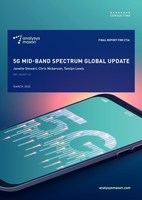
WASHINGTON, March 23, 2020 /PRNewswire/ -- The U.S. is "far behind" in licensed mid-band spectrum availability and faces a growing mid-band spectrum deficit as other countries release more of these airwaves for 5G, making the identification of more mid-band spectrum an important priority for policymakers, a new Analysys Mason study finds.
"U.S. policymakers should be praised for their focus on making 2020 the year of mid-band. This report highlights just how quickly other nations continue to open more of these key airwaves for 5G," said Meredith Attwell Baker, CTIA President and CEO. "We need a roadmap to effectively double the amount of mid-band spectrum set for auction this year, and the 3.1-3.55 GHz and 6 GHz bands are the two clear opportunities to support America's 5G economy."
Analysys Mason looked at the amount of mid-band spectrum (3 GHz-7 GHz) currently available, as well as the amount expected to be available by the end of 2020 and by the end of 2022, in 14 key countries.
Key findings include:
- The U.S. Faces a Five-Fold Mid-band Deficit. On average, the study expects benchmark countries to make 382 megahertz of licensed mid-band available by the end of 2020, while the U.S. will only have 70 megahertz—meaning on average, these countries will have over five times more mid-band spectrum than the U.S. at the end of the year.
- Other Countries Continue to Make Even More Licensed Mid-band Available. The average amount of licensed mid-band spectrum expected to be available by the end of 2020 for leading nations Canada, China, Japan, South Korea and the U.K. has grown 32 percent from Analysys Mason's 2018 mid-band report. From the end of 2020 to 2022, the average amount of mid-band being made available for 5G use in these five leading nations is projected to grow by a further 22 percent to over 660 megahertz.
- U.S. Needs to Effectively Double its Licensed Mid-band to Keep Up with Leading Nations. The FCC is poised to make real progress this year, auctioning 280 megahertz of C-band spectrum and 70 megahertz of CBRS spectrum. That 350 megahertz of mid-band is a significant and positive step forward, but the U.S. needs to effectively double that amount to keep up with countries like Japan, China, Canada, South Korea and the U.K.
"To continue as 5G leaders, our study finds making more mid-band spectrum beyond initial amounts made available in the 3.5 GHz band is being treated with priority in several other markets," said Janette Stewart, a Principal with Analysys Mason and the lead author of the report. "With the ideal blend of coverage and capacity in mid-band spectrum, our research indicates that outside of the U.S., every wireless provider that has launched 5G in the benchmark countries—19 out of 19—has used mid-band spectrum in its initial 5G launch."
The full study is available at CTIA.org.
About Analysys Mason
Analysys Mason (www.analysysmason.com) is a global specialist adviser in telecoms, media and technology (TMT). At the core of Analysys Mason's offer are two key services: TMT consultancy and research.
Since 1985, Analysys Mason has played an influential role in key industry milestones and helping clients through major shifts in the market. We continue to be at the forefront of developments in the digital economy and are advising clients on new business strategies to address disruptive technologies. With over 350 staff in 17 offices worldwide, we are respected internationally for our exceptional quality of work, independence and flexibility in responding to client needs. For 35 years we have been helping clients in more than 110 countries to maximise their opportunities. Over the past three years Analysys Mason has conducted nearly 70 5G-related projects, in 21 countries, for 46 different clients, as well as authoring the mid-band spectrum report for CTIA.
About CTIA
CTIA® (www.ctia.org) represents the U.S. wireless communications industry and the companies throughout the mobile ecosystem that enable Americans to lead a 21st century connected life. The association's members include wireless carriers, device manufacturers, suppliers as well as apps and content companies. CTIA vigorously advocates at all levels of government for policies that foster continued wireless innovation and investment. The association also coordinates the industry's voluntary best practices, hosts educational events that promote the wireless industry and co-produces the industry's leading wireless tradeshow. CTIA was founded in 1984 and is based in Washington, D.C.
SOURCE CTIA








Share this article